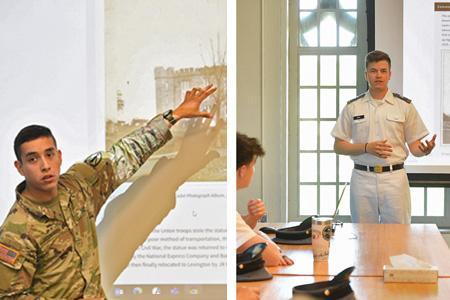2021-2022 | VMI Cadets Research Heavy Loads
Website Shares Cadets' "Rewarding" Research

Jonathan Ballesteros-Novoa ’24 points to a photo of barracks from the late 1800s during his final Fieldwork presentation on May 3. Joshua Farr ’23 highlights the early years of VMI based on findings in archives on May 3.—VMI Photos by Kelly Nye.
LEXINGTON, Va., May 6, 2022—This spring semester, Lt. Col. Pennie Ticen, Ph.D. associate professor in the Department of English, Rhetoric, and Humanistic Studies at Virginia Military Institute, decided to team with Maj. Jeff Kozak, head of archives & records management, for Fieldwork, a required course for English majors. Fieldwork projects give cadets opportunities to practice good citizenship by engaging in community-based service learning. Cadets’ fieldwork experiences may also involve projects for business, professional, or non-profit organizations, and usually take place off-post.
Ticen and Kozak offered the project on-post called, “Cadet Life Over Time.” It involved having the cadets delve into the wealth of VMI archives held at Preston Library, digitizing them, and building webpages. “From my first conversations with Major Kozak, I knew the archives had a wealth of physical materials that hadn’t yet been prepared for digital access. I have known and worked with him since he was an archivist for the Marshall Museum Library, and I was confident he would be a strong partner for this project,” said Ticen.
Twelve cadets taking the class worked in pairs and covered six eras:
- Early Years: the conversion of the state arsenal into VMI to the beginning of the Civil War. Timeline: late 1830s to late 1850s. Researched by Joshua Farr ’23 and Michael Lawrence ’23
- Post-Civil War (reconstruction era). Researched by Emma Faust ’23 and Jonathan Ballesteros-Novoa ’24
- Turn of the Century: Timeline 1885 -1915. Researched by Kolton Dobson ’23 and Keenan Orr ’23
- World War I and VMI alumnus, Thomas Amory, Class of 1916. Researched by Michael Tempesta ’22 and Lancelot Wiemann ’22
- Great Depression. Timeline 1929-1936. Researched by Justine Curcio ’22 and Francis Ripley ’23.
- World War II and VMI alumnus, Richard Niess ’44. Researched by James Mills ’23 and Thomas Owen ’23
Lawrence, who researched the Early Years, said that he had talked last semester with Ticen about what the class would encompass, and he looked forward to it. He was intrigued with the progression of how the state arsenal became VMI. “The cadets back then had a harder course load than we do, and because travel was slow back then, many of the cadets stayed here year-round,” stated Lawrence.
Ripley, a double major in history and English, acknowledged, “I enjoyed the class because it gave me hands-on experience in archival research. In researching the Great Depression era, I discovered that the depression only mildly affected VMI, which in turn was able to support many in the Lexington area on which the depression had a greater impact.”
Wiemann, an English major who covered WWI, confessed, “I did not expect this class to be fun or exciting, but after the first two meetings, I found myself thoroughly enjoying and looking forward to the class. While my partner and I were both interested in our research topic of WWI, the process of searching through a physical archive collection for information was a new experience for us. I was surprised with the vast amount of information available in the archives.” Wiemann continued, “As a commissioning cadet, I found Thomas Amory’s story to be especially inspiring. Amory died while selflessly putting the lives of his men before that of his own. As a future officer of Marines, I hope to follow Amory’s example by putting others before myself.”
Wiemann’s partner, Tempesta, agreed with Wiemann regarding the expanse of archived information. “We started with a handful of files, and were able to build a detailed profile on Thomas Amory,” said Tempesta.
Kozak felt the results of the class were rewarding. “It is wonderful to be able to publicly display the cadets’ work on the VMI website where it can serve as an inspiration to other cadets and the public, to learn more about VMI’s history. The biggest surprise for me was the variety of records that the cadets used from the archives during their research. I thought they might stick to one kind of record, but they did not hesitate to use many different types of records including correspondence, annual reports, yearbooks, regulations, blueprints, newspapers, diaries and photographs,” said Kozak.
The cadets’ research webpages may be viewed at www.vmi.edu/archives/online-exhibits/cadet-fieldwork-and-research.
Marianne Hause
VMI Photos by by Kelly Nye
Communications & Marketing
VIRGINIA MILITARY INSTITUTE
.svg)
.png)